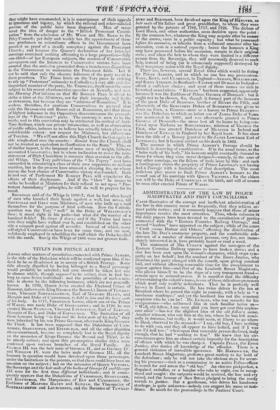TITLES FOR PRINCE ALBERT.
AMONG other matters of speculation connected with Prince ALBERT, is the title of the Dukedom which will be conferred upon him, if in- deed he be so ill-advised as to accept of :t British Peerage. Some title already dignified by having belonged to a Royal personage would probably be selected ; but care should be taken lest one be chosen which, though supposed to be extinct, does in thet be- long to some living individual: and the possibility of such a mis- take- is shown by the following instances, which are not generally known. In 1706, Queen ANNE created the Electoral Prince of Hanover, (afterwards King Gnortc:u the Second,) Baron of TI:WRES- IILMY, VISCOUllt NORTHALLERTON, Earl of Aht.ronn HAVEN, and Marquis and Duke of CAMBRIDGE, to hohl to him and the male mf/us body. In 1717, FatinnuicK LEWIS, eldest son of tile Prince of WALES, was made Duke of GLOUCESTER ; and in 1720, he was created Baron SxAwoos, Viscount L.suNeLsrox, Earl of ELTIIAM, Marquis of ELY, and Duke of Emsounnu. The limitation of all those honours being " to hint and Ow heirs male qf his body," they were inherited by his son Prince Gsoann, afterwards King G mums the Third. it has been supposed that the Dukedoms of C.tst- GLOUGEATER, and Em-suriton, and all the other dignities above-mentioned, became so cmnpletely lost in the Regal dignity on the accession of Kings GEORGE the Second and Third, as to be utterly extinct; and upon this presumption similar titles were conferred upon various branches of the Royal Family. As Crante.s: Ill, was the heir male of GEORGE II., and as GEORGE 1V. and WILLIAM IV. were the heirs male of Gsmann III., all the honours in question would have devolved upon those personages, under the limitations in the patents so that there could have been no question 'on the subject ; but on the accession of Queen VieTonrs, the Sovereign and the heir male if the bodies of George H. and George M. were for the first: time different individuals ; and it conse- quently appears that the Dukedoms Of CAMBRIDGE, Cri.orcEsrEn, and EDINBURGH, the 31arquisates of ELY and CAmtutoon, • the' Earldoms of MILFORD HavEx and ELTHAM, the Viseounties of NoaTtskilzarrozt .and -LArNCESTON) and the Baronies of TEWKES. BURY and SN4I.Mpport, have devolved win th6 King of IILNoVER, as heir male of his father and great grandfather, to whom they were granted by the patents of 1706, 1717, and 1726. The dictum of 'Lord HALE, and other authorities, seem decisive upon the point : By the common law, whatever the King may acquire after he cemek' to the crown, vests in a politic capacity • but what he possessed-, before his accession, or inherits from a collateral ancestor after accession, rests in a natitral capacity : hence the honours a may have possessed before his accession, remain in their origin state ; and when the heir to whom they were limited is a different person from the Sovereign, they will necessarily descend to such . heir, instead of being (as is erroneously supposed) destroyed by - their temporary union with the Royal dignity. There arc however, several Royal titles which would be fitting for Prince :ALBERT, and to which no one has any pretensions.i • YORE, KENT, ;Ma CLARENCE, ill STRATHEARN, • . and SAINT ANDREW, in Scotland—Uisrma and DUBLIN in Ireland-- affbrd a sufficient choice ; and most of those names are rich in historical associations. " KENDAL" has been suggested, apparently because it was the Earldom of Prince GEORGE of Denmark : but it ought not to be chosen, for, though it formed part of the honours - of the great Duke of Benroun, brother of HENRY the Fifth, and afterwards of the BEAUFORTS Dukes of SOMERSET—Was given to :fonts on Fors a Gascon—next as a barons- to Prince RUPERT." was the DukeClom to which an inflint son of "J.ssiEs Duke of Yousr. was nominated in 1(i, and was afterwards granted to Prince GEonen of Denmark—the name lost all its lustre by being con- ferred upon 3lada11ie DE SCHULENBERG, mistress of GEORGE the First, who was created Dutchess of Muxs-ren in Ireland and Dutchess of' KENDAL in England by her Royal lover. It has since been the title of a Barony granted to Sir JAMES LOWTHER Earl of LONSDALE ; but it became extinct on his death in 1802. • The manner in which Prince ALBERT'S Peerage should be limited is deserving of consideration. If in the usual terms, to the . "heirs male of his body," his honours might eventually descend to those for whom they were never designed—namely, to the sons of any other marriage, on the failure of male issue by this : and such a contingency shows the propriety of Prince LEOPOLD'S not having had a Peerage with a limitation of that description. The most judicious plan seems to limit Prince ALBERT s honours to the second son of his marriage with Queen VicTonin ; for the eldest • son will be the Duke of CORNWALL at his birth, and will of courge•-• be soon after created Prince of WALES.


























 Previous page
Previous page